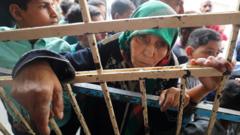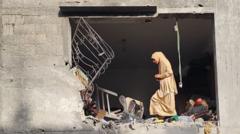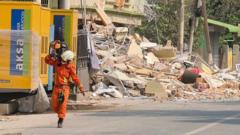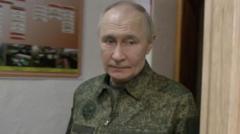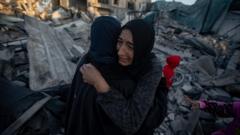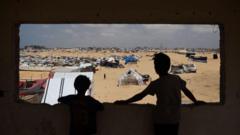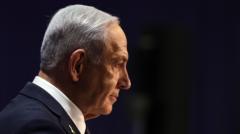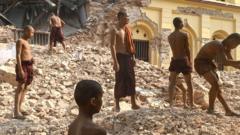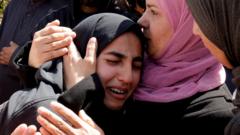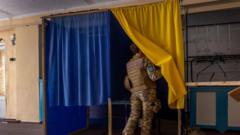The incident, which injured seven others, raises serious concerns over the fragility of the recently established truce between Israel and Hezbollah. Following a deadly strike on the Dahieh area, the Israeli military justified the operation, claiming it targeted a Hezbollah operative involved in planning attacks against Israeli citizens.
Israeli Air Strike in Beirut Claims Four Lives, Fractures Ceasefire Agreement
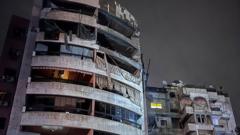
Israeli Air Strike in Beirut Claims Four Lives, Fractures Ceasefire Agreement
An Israeli air attack on Beirut's southern suburbs, as reported by Lebanon’s health ministry, has resulted in four fatalities despite an existing ceasefire.
Israeli airstrike in Beirut breaks fragile ceasefire, causing casualties
An Israeli military operation in Beirut's Dahieh region has resulted in four deaths, prompting strong condemnation from the Lebanese government and raising fears of resuming hostilities amid a ceasefire agreement with Hezbollah. The IDF stated the strike was necessary to neutralize a specific threat involving Hezbollah's assistance to Hamas, while Lebanese leaders deride the attack as a blatant breach of the established truce.
The health ministry in Lebanon confirms that four individuals lost their lives in an Israeli airstrike targeting the southern suburbs of Beirut, a stronghold of the armed group Hezbollah. This attack further complicates the tenuous ceasefire that had been in place since November, following over a year of conflict. Reports indicate that seven others were injured in the strike, which occurred unexpectedly during the night hours.
Israel maintains that the strike focused on Hassan Ali Mahmoud Bdeir, a Hezbollah operative accused of coordinating with Hamas to plan attacks against Israeli civilians. Citing an "immediate threat," the Israeli military declared it would continue its operations against Hezbollah to thwart potential terrorist actions. In stark contrast, Lebanon's President Joseph Aoun denounced the strike as "a dangerous warning," while Prime Minister Nawaf Salam condemned it as a “flagrant violation” of the ceasefire.
The latest strike follows an earlier incident in which Israel had conducted an airstrike in Beirut—the first since the ceasefire took effect. These operations have reportedly occurred almost daily, with Israel aiming to prevent Hezbollah from rearming, leading to growing tensions between the two sides.
Hezbollah's refusal to claim responsibility for a recent rocket attack, along with its allegiance to the ceasefire, complicates the military and political landscape further. The ongoing conflict has already resulted in significant civilian casualties and displacement, with approximately 4,000 deaths and over 1.2 million displaced individuals cited in the last month's violence, emphasizing the profound humanitarian crisis stemming from this prolonged disagreement over territorial and political power in the region.
An Israeli military operation in Beirut's Dahieh region has resulted in four deaths, prompting strong condemnation from the Lebanese government and raising fears of resuming hostilities amid a ceasefire agreement with Hezbollah. The IDF stated the strike was necessary to neutralize a specific threat involving Hezbollah's assistance to Hamas, while Lebanese leaders deride the attack as a blatant breach of the established truce.
The health ministry in Lebanon confirms that four individuals lost their lives in an Israeli airstrike targeting the southern suburbs of Beirut, a stronghold of the armed group Hezbollah. This attack further complicates the tenuous ceasefire that had been in place since November, following over a year of conflict. Reports indicate that seven others were injured in the strike, which occurred unexpectedly during the night hours.
Israel maintains that the strike focused on Hassan Ali Mahmoud Bdeir, a Hezbollah operative accused of coordinating with Hamas to plan attacks against Israeli civilians. Citing an "immediate threat," the Israeli military declared it would continue its operations against Hezbollah to thwart potential terrorist actions. In stark contrast, Lebanon's President Joseph Aoun denounced the strike as "a dangerous warning," while Prime Minister Nawaf Salam condemned it as a “flagrant violation” of the ceasefire.
The latest strike follows an earlier incident in which Israel had conducted an airstrike in Beirut—the first since the ceasefire took effect. These operations have reportedly occurred almost daily, with Israel aiming to prevent Hezbollah from rearming, leading to growing tensions between the two sides.
Hezbollah's refusal to claim responsibility for a recent rocket attack, along with its allegiance to the ceasefire, complicates the military and political landscape further. The ongoing conflict has already resulted in significant civilian casualties and displacement, with approximately 4,000 deaths and over 1.2 million displaced individuals cited in the last month's violence, emphasizing the profound humanitarian crisis stemming from this prolonged disagreement over territorial and political power in the region.

